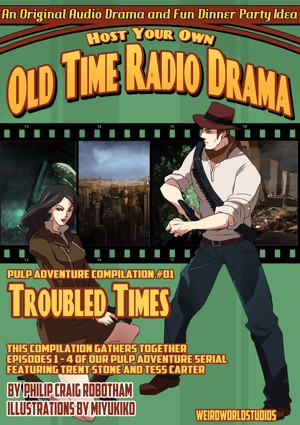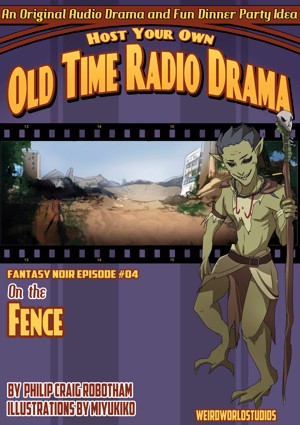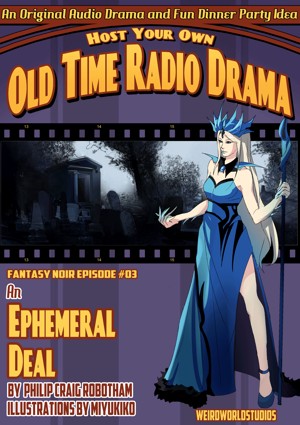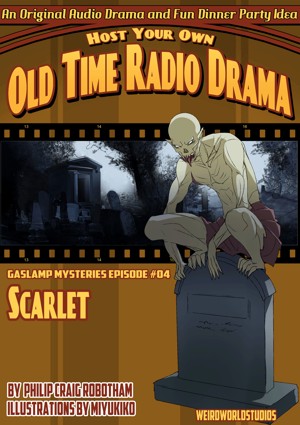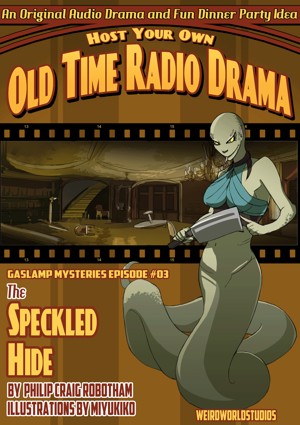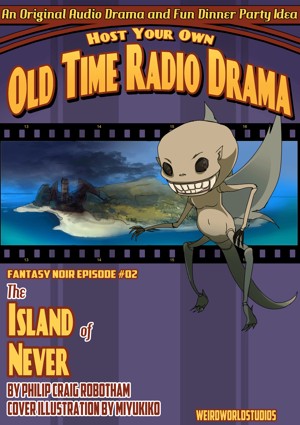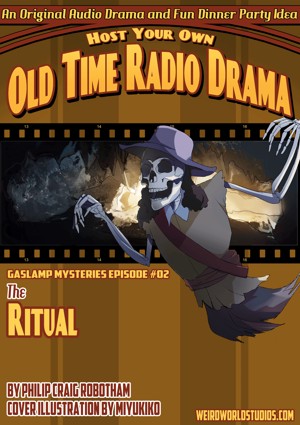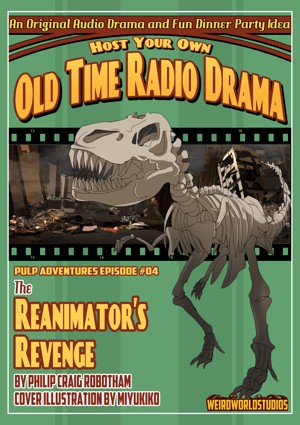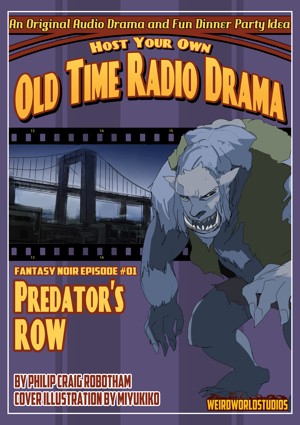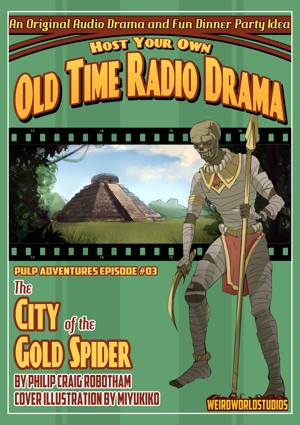Share with Friends
Interview with Philip Craig Robotham
Published 2014-01-31.
Smashwords Interviews are created by the profiled author or publisher.
Latest books by This Author
PACMP001 - Troubled Times
by Philip Craig Robotham
Series: Trent Stone and Tess Carter Pulp Adventures, Compilation (Eps 1-4).
Price:
$35.99 USD.
Words: 72,000.
Language:
English.
Published: March 10, 2014
.
Categories:
Fiction » Adventure » Action, Fiction » Adventure » General
This compilation gathers together Episodes 1 - 4 of our Pulp Adventure Serial featuring Trent Stone and Tess Carter.
Episode 1: The Alligator Menace
Episode 2: The Cult of the Teeth
Episode 3: The City of the Gold Spider
Episode 4: The Reanimator's Revenge
FN004 On the Fence
by Philip Craig Robotham
Series: Tony Wells and Claire Templeton Fantasy Noir, Episode 4.
Price:
$25.99 USD.
Words: 20,080.
Language:
American English.
Published: March 10, 2014
.
Categories:
Fiction » Adventure » Action, Fiction » Mystery & detective » Hard-Boiled
When information provided about the black market puts Claire Templeton in touch with a fence who is quickly murdered (by means that can only be described as magical), she is drawn into a brand new faery plot to destroy the city, sever and isolate the mortal realm, and pave the way for a faery takeover. Can Claire solve the case and save the day before her home town becomes a giant crater?
FN003 An Ephemeral Deal
by Philip Craig Robotham
Series: Tony Wells and Claire Templeton Fantasy Noir, Episode 3.
Price:
$25.99 USD.
Words: 17,100.
Language:
American English.
Published: March 3, 2014
.
Categories:
Fiction » Adventure » Action, Fiction » Mystery & detective » Hard-Boiled
Things are slow at the office of Tony Wells, Private Eye, when Claire Templeton turns up with a business proposition. Someone is trying to kidnap her and Tony finds himself once more plunged into the intrigues of the fae courts. The squabbles of the faery realm easily impact the mortal realm and, with Claire’s life on the line, Tony must sort through all the double dealings on his own.
Scarlet
by Philip Craig Robotham
Series: Sherlock Holmes and Martha Hudson Gaslamp Mystery, Episode 4.
Price:
$25.99 USD.
Words: 17,520.
Language:
American English.
Published: February 22, 2014
.
Categories:
Fiction » Adventure » Action, Fiction » Mystery & detective » Traditional British
A chance encounter in a curio shop with a man searching for his lost fiancée draws Sherlock Holmes into his strangest case to date. Almost one hundred people have gone missing from the streets of Highgate and mysterious “scavengers” are terrorizing the streets at night. When Holmes himself becomes the chief suspect in the kidnappings he is forced to uncover the terrifying truth.
GM003 - The Speckled Hide
by Philip Craig Robotham
Series: Sherlock Holmes and Martha Hudson Gaslamp Mystery, Episode 3.
Price:
$25.99 USD.
Words: 14,540.
Language:
American English.
Published: February 15, 2014
.
Categories:
Fiction » Adventure » Action, Fiction » Mystery & detective » General
Sherlock Holmes’ career is quite well established when Martha Hudson introduces him to Helen Stoner, a runaway who fears her guardian is attempting to murder her. An encounter with the inhumanly strong Dr Roylott convinces Holmes that the affair deserves his attention. Encountering shape-shifters, a monstrous demon,and a woman believed dead Sherlock and Martha attempt once more to save the day.
FN002 - The Island of Never
by Philip Craig Robotham
Series: Tony Wells and Claire Templeton Fantasy Noir, Episode 2.
Price:
$25.99 USD.
Words: 18,280.
Language:
American English.
Published: February 8, 2014
.
Categories:
Fiction » Adventure » Action, Fiction » Mystery & detective » General
Tony Wells’ life is changed forever when his vindictive Lieutenant assigns him a politically sensitive kidnapping case.The kidnapping leads Tony and his friend Claire Templeton from the streets of Star City through a magical portal and into a pocket universe where they must defeat an evil fae noble for the freedom of the children or face being trapped forever. Can they survive once more?
GM002 - The Ritual
by Philip Craig Robotham
Series: Sherlock Holmes and Martha Hudson Gaslamp Mystery, Episode 2.
Price:
$25.99 USD.
Words: 14,590.
Language:
American English.
Published: January 31, 2014
.
Categories:
Fiction » Adventure » Action, Fiction » Mystery & detective » General
Sherlock Holmes has just left university and is seeking to make a name for himself as an investigator of the unusual when Reginald Musgrave, an acquaintance from the university, arrives requesting Holmes and Martha look into the disappearance of two of his domestic staff. Can Holmes determine what is haunting the Musgrave Ancestral home and why?
PA004 The Reanimator's Revenge
by Philip Craig Robotham
Series: Trent Stone and Tess Carter Pulp Adventures, Episode 4.
Price:
$25.99 USD.
Words: 25,720.
Language:
American English.
Published: August 26, 2013
.
Categories:
Fiction » Adventure » Action, Plays » Australian & Oceanian
When visiting the Star City Penitentiary Trent and Tess encounter a gypsy woman who warns that the city is facing imminent destruction. The pair are led to the City Cemetery where they are attacked by corpses. Now Trent and Tess must race against time to face down the villain before the city is completely destroyed.
FN001 Predator's Row
by Philip Craig Robotham
Series: Tony Wells and Claire Templeton Fantasy Noir, Episode 1.
Price:
$25.99 USD.
Words: 18,820.
Language:
English.
Published: August 26, 2013
.
Categories:
Fiction » Adventure » Action, Plays » Australian & Oceanian
Investigating the kidnapping of a seven-year-old girl, detective Tony Wells is caught up in a nightmare world where Faery Courts battle it out, where trolls fight for scraps beneath modern bridges, and where a magical sword has an agenda all its own. Wells must now work to uncover a murderer in order to prevent a war among the immortals from spilling over into the mundane realm.
PA003 The City Of The Gold Spider
by Philip Craig Robotham
Series: Trent Stone and Tess Carter Pulp Adventures, Episode 3.
Price:
$25.99 USD.
Words: 20,620.
Language:
American English.
Published: August 26, 2013
.
Categories:
Fiction » Adventure » Action, Plays » Australian & Oceanian
When a young South American man succeeds in foiling an attempt on the lives of Trent Stone and Tess Carter only to be killed moments later by a remotely controlled spider, their sense of duty brings them face to face with corrupt police, eerily intelligent howler monkeys, and Aztec mummies, in a fight against a combination of science and magic in this exciting South American adventure.

